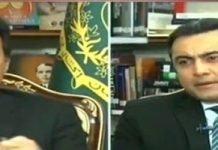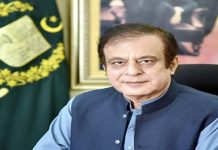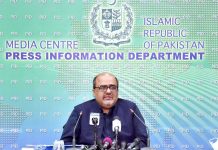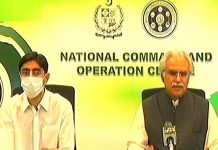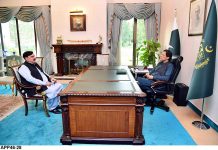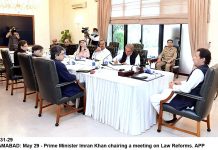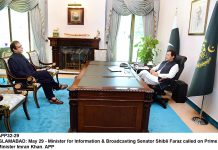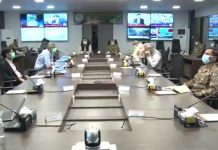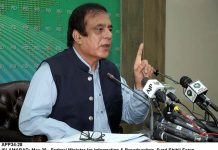It has literally been a week of daggers drawn; a healthy Nawaz Sharif thundered online to enthrall the participants of the All Parties Conference (APC), and his followers in particular. With innocence, he laid the entire blame for all ills this country faces on the establishment, which his colleague Ahsan Iqbal conceded (On September 24) holds the real power in the country.
Within 24 hours of the APC declaration of “war on the selected government” came the thunderbolt; nearly 15 political stalwarts – including all those who berated the government for the support it draws from the military establishment – attended a “secret” September 16 meeting with the Army Chief Gen Qamar Bajwa and head of the ISI Lt Gen Faiz Hameed. Their speeches at the APC hardly betrayed they had spent hours together with the security top brass at the ISI.
A string of claims and denials have ensued since.
First came a straight denial by Maryam Nawaz. No one representing former prime minister Nawaz Sharif met Chief of Army Staff General Qamar Javed Bajwa, she told media, literally disowning uncle Shahbaz Sharif, Ahsan Iqbal and Khawaja Asif as PML-N representatives.
As if to counter this, Mohammad Zubair, a PML-N cohort, took to the Twitter to tell the nation that “Gen. Qamar Bajwa is an old friend & not only that I have met him many times as a friend but our families have also been meeting cordially over dinners etc. In my most recent meeting with him economy, politics and MNS & MN all came under discussion. No relief (for Nawaz Sharif or Maryam) was ever requested.
But the ISPR Maj Gen Babar Iftikhar practically rubbished the later part by claiming Zubair held two meetings in the last week of August and on September 7 respectively. “In both meetings he (Zubair) talked about Mian Nawaz Sharif sahib and Maryam Nawaz sahiba,” Maj Gen Iftikhar said.
But when a journalist attempted to dig deeper in to the entire affair, she was arrogantly snubbed by an apparently frustrated Maryam Nawaz Sharif. “Do not try to act smart and play nasty. I gave a principled statement which is in line with what our constitution says. Don’t make it sound like it was directed at our party president or any specific member,” Maryam said in a Sep 23 tweet, triggering a storm of reactions on the social media.
Lessons:
This episode carries a number of take-aways, and has brought to fore the contradictions of the Pakistani politics, which have thrived on countless theories about the perennial civil-military conflict.
Firstly, Prime Minister Imran Khan was conspicuously missing from the infamous dinner. He was either ignored or he himself was reluctant to share the table with people he publicly dislikes, if not abhors, for having “led the country into a governance nightmare.”
Secondly, the military establishment remains a coherent monolithic clever entity which takes calculated steps, with great degree of pre-planning and pre-positioning to catch politicians off-guard.
The GHQ has always stood and struck together as an institution.
Thirdly, politicians, on the contrary, remain divided, incoherent, superficial and not at all given even to medium term solutions for the multitude of governance and economic issues.
Fourth, civilian leaders mostly radiate as well as demonstrate casual approaches even at public meetings (Twitter and other social media platforms of late have been awash with old videos containing slander and derogatory speeches against one another).
It seems they would care less even if called out for (dis)honesty and lying. Statements both by Zubair and Maryam reflect two different sets of explanations.
Fifthly, the entire dinner saga has left the N-League’s image badly bruised and exposed the two faces it has held. Beyond doubt, their credibility has taken an irreparable hit.
Strangely, despite having suffered a severe blow to its credibility, the party has not directly called out the establishment for “leaking” an in-camera meeting.
Meanwhile it is evident that the counter-move (leak of the September 16 meeting) most probably resulted from Sharif’s strident attacks on the military, which presumably had told interlocutors such as Zubair there will be no relief either for senior Sharif or his daughter.
GHQ appears to have stuck to its advice on going back to the parliament for settling political matters and the courts for legal relief. This despite, officials say, Shahbaz Sharif’s repeated offers for cooperation in several meetings in Rawalpindi.
This advice leaves little doubt that the GHQ stands firmly behind the incumbent prime minister, most probably because they both seem to share the agenda of economic revival and governance reforms.
The refusal to requests for relief, so it seems, forced a frustrated Nawaz Sharif to unleash his contemptuous remarks about the security apparatus, fiercely singling out the GHQ for all the mess that the country is in today.
Lastly, regardless of the shallowness of his thoughts on the rule of law (as an absconder), the integrity of all stakeholders has taken a serious hit, and exposed the numerous contradictions that rule the roost here.

